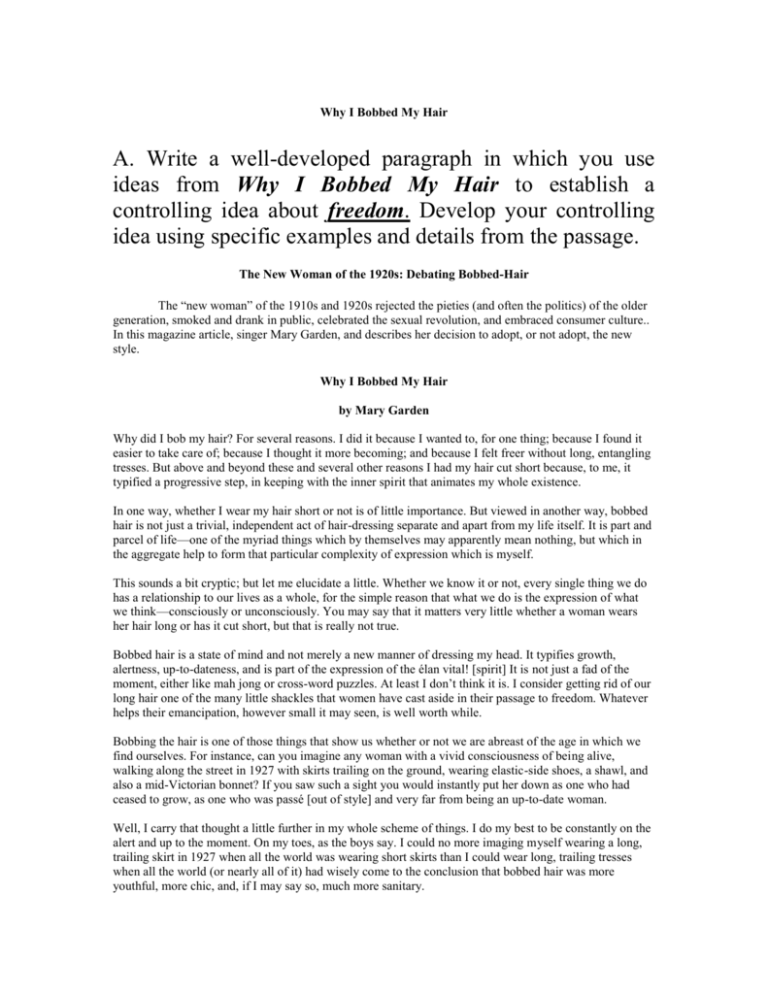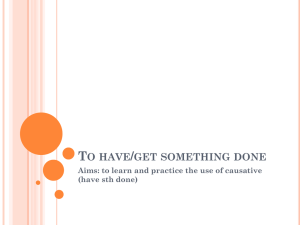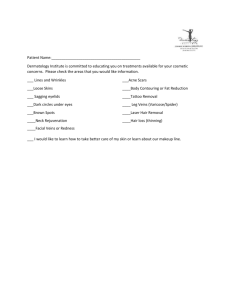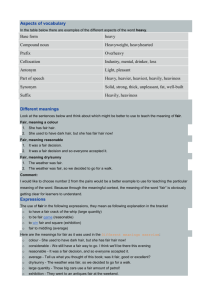The New Woman of the 1920s: Debating Bobbed-Hair
advertisement

Why I Bobbed My Hair A. Write a well-developed paragraph in which you use ideas from Why I Bobbed My Hair to establish a controlling idea about freedom. Develop your controlling idea using specific examples and details from the passage. The New Woman of the 1920s: Debating Bobbed-Hair The “new woman” of the 1910s and 1920s rejected the pieties (and often the politics) of the older generation, smoked and drank in public, celebrated the sexual revolution, and embraced consumer culture.. In this magazine article, singer Mary Garden, and describes her decision to adopt, or not adopt, the new style. Why I Bobbed My Hair by Mary Garden Why did I bob my hair? For several reasons. I did it because I wanted to, for one thing; because I found it easier to take care of; because I thought it more becoming; and because I felt freer without long, entangling tresses. But above and beyond these and several other reasons I had my hair cut short because, to me, it typified a progressive step, in keeping with the inner spirit that animates my whole existence. In one way, whether I wear my hair short or not is of little importance. But viewed in another way, bobbed hair is not just a trivial, independent act of hair-dressing separate and apart from my life itself. It is part and parcel of life—one of the myriad things which by themselves may apparently mean nothing, but which in the aggregate help to form that particular complexity of expression which is myself. This sounds a bit cryptic; but let me elucidate a little. Whether we know it or not, every single thing we do has a relationship to our lives as a whole, for the simple reason that what we do is the expression of what we think—consciously or unconsciously. You may say that it matters very little whether a woman wears her hair long or has it cut short, but that is really not true. Bobbed hair is a state of mind and not merely a new manner of dressing my head. It typifies growth, alertness, up-to-dateness, and is part of the expression of the élan vital! [spirit] It is not just a fad of the moment, either like mah jong or cross-word puzzles. At least I don’t think it is. I consider getting rid of our long hair one of the many little shackles that women have cast aside in their passage to freedom. Whatever helps their emancipation, however small it may seen, is well worth while. Bobbing the hair is one of those things that show us whether or not we are abreast of the age in which we find ourselves. For instance, can you imagine any woman with a vivid consciousness of being alive, walking along the street in 1927 with skirts trailing on the ground, wearing elastic-side shoes, a shawl, and also a mid-Victorian bonnet? If you saw such a sight you would instantly put her down as one who had ceased to grow, as one who was passé [out of style] and very far from being an up-to-date woman. Well, I carry that thought a little further in my whole scheme of things. I do my best to be constantly on the alert and up to the moment. On my toes, as the boys say. I could no more imaging myself wearing a long, trailing skirt in 1927 when all the world was wearing short skirts than I could wear long, trailing tresses when all the world (or nearly all of it) had wisely come to the conclusion that bobbed hair was more youthful, more chic, and, if I may say so, much more sanitary. This attention to what is of the living present has a special application, I think, to those of us who are what the world designates as creative artists. We, of all people, must be very careful not to allow ourselves to stagnate in any manner whatsoever—mentally, artistically, or physically. To be an artist means to grow. An artist can not afford to do anything else. To stand still means, paradoxically enough, to go backward, and for an artist that is fatal. To keep on growing means the constant necessity for getting a correct perspective of ourselves. We must stand off, so to speak, and look at ourselves through very critical glasses. If we once lose our perspective we lose all. Life itself is growth, and the minute we allow ourselves to stop growing we really stop being vitally alive. And it is so fatally easy for people to get into a rut, to bask in the noonday sun of self-satisfaction[,] to cease to grow. Take my own profession, for instance. In the realm of grand opera, ignoring precedent and striking out into new paths is one of the hardest things to achieve. How easy it is for the producers of opera to be content with age old traditions, to go on going the easy thing. The antiquated thing that has become so much a matter of habit that thinking about it becomes unnecessary! And how deadening and monotonous a thing to the singer a continual round of roles of the old order can become! Did I say “Deadening and monotonous”? Stagnating rather, I would sooner pass into oblivion than to cease progressing and growing while I possessed the impetus to live and to work. And if I didn’t look at myself every now and then in perspective I too would stop growing. As a concrete example of what I mean, last summer I paid a visit to the Opera House in Paris for the first time since I left it in 1906. I asked for this one and that one of my old associates, and in more instances than I care to think of they had all retired from active work. Not from old age either, be it said. They had simply stopped growing, and the inevitable sliding backward had taken place, until the positions they had once held were no longer theirs. You may wonder what all this has to do with my having bobbed my hair, but as I said above, every seemingly single act we perform is really a small square in the whole mosaic of life, and when all the little pieces are put together they form the complete pattern of existence. Many of the trivial daily happenings of life are so subtle and so deceiving in their significance that very frequently we do not catch their meaning until long after they have occurred. Then, too late alas! We find that these petty affairs, so infinitesimal by themselves, have by accumulation assumed a most important influence in our lives. When I consider the achievements of women in the past few years in the field of athletics I find it impossible to do so without taking into account the tremendous freedom-giving changes in fashion that have accompanied them. And enjoying the blessings of short hair is a necessary part of those fashion changes. To my way of thinking, long hair belongs to the age of general feminine helplessness. Bobbed hair belongs to the age of freedom, frankness, and progressiveness. This is my view of the situation, but I should like to state most emphatically that I have no desire to lay down any fixed arbitrary rule for any one else to follow. Whether a woman wears her hair long or short, is her individual affair. I only know which I prefer. I can see nothing but what is progressive or beneficial in bobbed hair for women, altho I must admit there is one very tragic situation that is the direct result of women bobbing their hair, and that is, of course, the sorry plight of the hairpin manufacturers.








